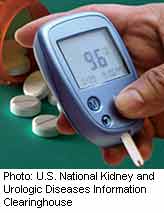Treatment of impaired fasting glucose, impaired glucose tolerance can delay progression to diabetes
TUESDAY, April 14, 2015 (HealthDay News) — Type 2 diabetes screening is not associated with improved mortality rates after 10 years of follow-up, according to a U.S. Preventive Services Task Force (USPSTF) review published online April 14 in the Annals of Internal Medicine.
Shelley Selph, M.D., M.P.H., from Pacific Northwest Evidence-Based Practice Center and Oregon Health & Science University in Portland, and colleagues conducted a systematic literature review to update the 2008 USPSTF review on diabetes screening in adults.
The researchers found that screening for diabetes correlated with no 10-year mortality benefit versus no screening in two trials. Based on 16 trials, there was consistent evidence that treatment of impaired fasting glucose (IFG) or impaired glucose tolerance (IGT) correlated with delayed progression to diabetes. Most trials of IFG or IGT treatment found no effects on all-cause or cardiovascular mortality, but in one trial, lifestyle modification correlated with reduced risk for both outcomes after 23 years. In one trial there was no effect of an intensive multifactorial intervention on risk for all-cause or cardiovascular mortality versus standard control for screen-detected diabetes. Nine systematic reviews showed that intensive glucose control did not reduce the risk for all-cause or cardiovascular mortality in diabetes that was not specifically screen-detected, and intensive blood pressure control results were inconsistent.
“More evidence is needed to determine the effectiveness of treatments for screen-detected diabetes,” the authors write.
Full Text
Editorial (subscription or payment may be required)
Copyright © 2015 HealthDay. All rights reserved.








